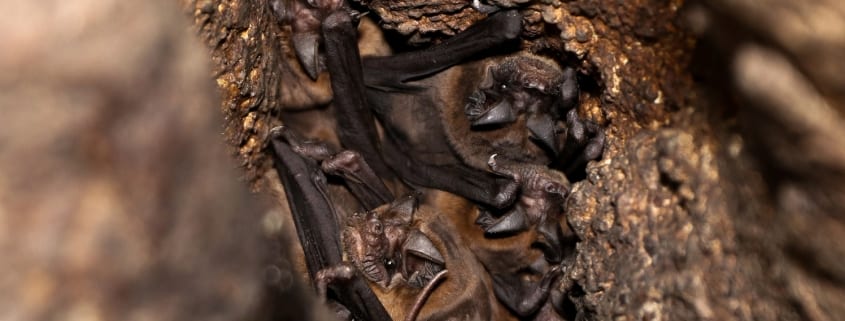Land Purchase Creates Fiji’s First Bat Sanctuary
Rainforest Trust celebrates the purchase of over 20 acres in Fiji to protect the land around Nakanacagi Cave, home to the only known maternity colony of the Endangered Fijian Free-tailed Bat, creating the nation’s first bat sanctuary. This strategic purchase on Vanua Levu Island was undertaken in partnership with our local partner, the National Trust of Fiji, together with Bat Conservation International (BCI) – and was officially dedicated with a large, local ceremony on July 17.
“This is an exceptional opportunity to protect a single site that is literally irreplaceable for the security of the Fijian Free-tailed Bat,” said Dr. George Wallace, Chief Conservation Officer for Rainforest Trust.
“In the absence of protection, the fate of nearly the entire global population would be potentially in jeopardy, but we have a chance here to provide a much more certain future for the species.”
Securing this parcel of land initiates the process of creating the new Nakanacagi Cave Reserve. A forthcoming adjacent parcel will add over 30 additional acres, ensuring protection of the entire cave system and surrounding habitat. Ultimately, the entire area will be formally integrated into the Fijian government’s nascent protected areas system.
“The overall goal of this project is to establish sustainable partnerships that result in the long-term protection of the cave and the unique biodiversity of this area. Around 95 percent of the global population of Fijian Free-tailed Bats rely on this one site and initial biodiversity assessments recorded at least 20 endemic plants surrounding the cave,” said Chair of the National Trust of Fiji Craig Powell.
Some researchers believe the other 5 percent, on the island of Vanuatu, may actually be another bat species. This would make this cave system even more crucial for the species’ survival.
Local communities used to hunt Fijian Free-tailed Bats for food. Recent conservation outreach efforts have curbed bat consumption, but without formal protection, hunting could resume. The local partner is working to create a consensus amongst the local communities on the importance of conservation, and the Nakanacagi Cave Reserve’s creation is a vital part of this plan.
Hence, last week’s launch was an elaborate traditional dedication ceremony of prayer, kava, song, feast and dance, including one inspired by the bats themselves. The much revered Tui Macuata (Paramount Chief), Ratu Wiliame Katonivere, an outspoken conservationist, commended the village on ceasing the traditional harvest of the bats. Protection of the cave was further pledged by the District Chief and local community leaders in front of a group of around 300 ceremonial participants, made up of local community members, school children and guests from the local government, Rainforest Trust, BCI, National Trust of Fiji, Nature Fiji, Museum of Fiji, International Union for Conservation of Nature and the University of the South Pacific.
“The pageantry and high spirits of the dedication ceremony by the Nakanacagi villagers, clans and provincial leaders were inspiring,” said BCI Chief Conservation Officer Kevin Pierson, who attended the ceremony. “Of Fiji’s six bat species, five are in decline. This sanctuary is a critical step in the protection of the Fijian Free-tailed Bat and a wonderful first major conservation win for the Fijian Bat Conservation Initiative.”
Besides bat hunting, erosion and deforestation threaten the cave and surrounding habitat. Past logging and burning have degraded some areas of the native forest, causing it to be susceptible to damage from extreme winds that accompany tropical cyclones. With protection and restoration undertaken by Nature Fiji, the forest can begin to recover and make erosion less potentially damaging.
The reserve will be formalized over the next five years under the Fiji Forestry Department’s Reserve Demarcation Policy. A management plan will be put in place and local conservation rangers will be deployed to ensure continuing conservation successes.




